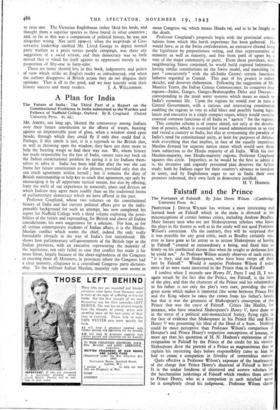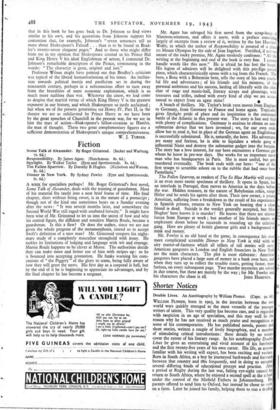Falstaff - and the Prince PROFESSOR J. DOVER WILSON has written
a most interesting and learned book on Falstaff which in the main is directed at the misconceptions of certain famous critics, including Andrew. Bradley. Mere literary men who are not Shakespearean scholars who know the plays in the theatre as well as in the study will not need _Professor Wilson's correction. On the contrary, they will be surprised that it was possible for any good critic, such as Bradley certainly was, ever to have gone so far astray as to accuse Shakespeare of having in Falstaff "created so extraordinary a being, and fixed him so firmly on his intellectual throne that when lie sought to dethrone him he could not." As Professor Wilson acutely observes of such critics, "it is they, and not Shakespeare, who have been swept off their feet by Falstaff." Would it surprise Professor Wilson if today most of us were more interested in the Prince than in Falstaff?
I confess when I recently saw Henry IV, Parts I and' II, I was again struck by the fact that the -Prince, not Falstaff, is the hero of the play, and that the character of the Prince and his relationshto to his father is not only the play's very core, providing the one great scene which makes it immortal (the scene between Prince Hal and the King where he takes the crown from his father's head), but that it was the greatness of Shakespeare's conception of the Prince that was the cause of Falstaff. Critics like Hailitt, for instance, who have attacked Shakespeare's Henry V, have done so in the stress of a political anti-monarchical frenzy, flying right in the face of evidence that Shakespeare in his Prince' Hal and King Henry V was presenting his ideal of the Head of a State. Nothing could be more -perceptive than Professor Wilson's .comparison of Hotspur's and Prince Henry's respective conceptions of honour, or more apt than his quotation of H. N. Hudson's explanation of the resignation to Falstaff by the Prince of the credit for his victory. Shakespeare drew the 'portrait of a Prince SQ magnanimous that to explain his roystering days before responsibility came to him he had to create, a companion in frivolity of tremendous stature.
Quite effective is Professor Wilson's exposure of the baselessness of the charge that Prince Henry's _dismissal of Falstaff is brutal. It is the undue fondness of cloistered and austere scholars fOr the bacchanalian junketings of Falstaff which renders them unjust to Prince Henry, who as a companion in such mischief never let it -completely cloud his judgement. . Professor Wilson. claim*
that in this book he has gone back to Dr. Johnson to find views similar to his owl, and his quotations from Johnson support his contention that, for example, Johnson's "seven sentences tell us more about Shakespeare's Falstaff . . . than is to be found in Brad- ley's twenty-seven eloquent pages." And to those who might differ from me in my opinion that Shakespeare created in his Prince Hal and King Henry V his ideal Englishman of action, I commend Dr. Johnson's remarkable description of the Prince, terminating in the words : "The character is great, original and just."
Professor Wilson might have pointed out that Bradley's criticism was typical of the liberal humanitarianism of his times. An inclina- tion towards political inertia and pacificism set in during the nineteenth century, perhaps in a subconscious effort to turn away from the brutalities of mere economic exploitation, which is so much more ruthless than war. Whatever the cause, we had come to despise that martial virtue of which King Henry V is the greatest exponent in our history, and which Shakespeare so justly acclaimed ; but when we of the present generation see Henry IV, Part II, in the theatre we are as exhilarated by Prince Harry as we have been by the great speeches of Churchill in the present war, for we see in him the man of action—Shakespeare's fellow-creation to Hamlet, the man of thought. These two great complementary figures are a sufficient demonstration of Shakespeare's unique comprehensiveness.
W. J. TURNER.



























 Previous page
Previous page